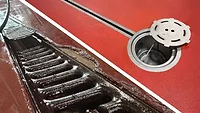Managed Cleaning Program Facilitates Cost Reductions for Food Processing Facilities
The emergence of foodborne pathogens such as Listeria monocytogenes, Salmonella, Escherichia coli O157:H7 and Campylobacter have grabbed national media attention and awareness. In today’s world, it has become critically important to have an effective sanitation program as part of a Hazard Analysis and Critical Control Points (HACCP) plan. A successful HACCP plan will include seven basic principles: hazard analysis, CCP identification, establishing critical limits, monitoring procedures, corrective actions, verification procedures and recordkeeping and documentation.
“All sanitation programs have the ultimate goal of reducing and/or eliminating all harmful contaminants,” says Chris Celusta, manager of food processing for Spartan Chemical. “Having an effective sanitation program not only ensures public safety but can help reduce costs by reducing spoilage and waste, avoiding recalls, decreasing labor hours associated with cleaning and lowering legal exposure.”
It is scientifically proven that rigorous and regular cleaning, as part of an HACCP plan, is associated with major decreases in foodborne pathogens. In order for an effective chemical sanitizer to work properly, the surface must be cleaned prior to the application of the sanitizer. Training of sanitation staff on how to clean more thoroughly is paramount to the success of the program.
“The need for cleaning, sanitizing and recordkeeping is well documented in the food processing industry,” explains Celusta. “Training of the sanitation staff is critical in order to maintain an effective program. Our approach is to train the staff with interactive education and validation tools that serve as on-going procedural and verification components in the HACCP program. The output of this training can be used to establish CCP limits and identify the need for corrective actions.”
Spartan uses a three-pronged approach to ensure proper cleaning and sanitation is achieved—TRAINING, VALIDATION and DOCUMENTATION. Spartan’s Training & Certification Program trains, tests and certifies staff on cleaning standards and methods. Handy, portable food processing training cards reinforce the training program and provide a framework for adherence to the standard going forward. This process is supported by Spartan’s ATP validation tools. ATP swabs and meter allow sanitation managers to train and assess staff cleaning operations while minimizing risk of transfer of harmful pathogens. The data can then be loaded into Spartan’s CompuClean® CMMS (Custodial Maintenance Management Software), which allows sanitation managers to document and monitor established CCP limits, verify program progress and identify the need for corrective action. In combination with Spartan’s wide range of cleaning and sanitizing chemicals, the system provides an end-to-end solution for HACCP plans.
Contact Chris Celusta ccelusta@spartanchemical.com to learn more about how Spartan’s food processing program can help you train, validate and document your way to cost reductions.
www.spartanchemical.com
Looking for quick answers on food safety topics?
Try Ask FSM, our new smart AI search tool.
Ask FSM →







